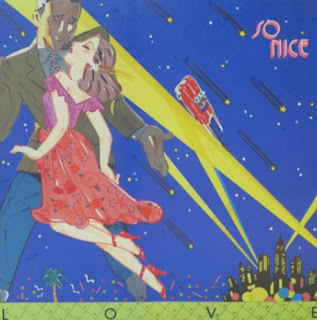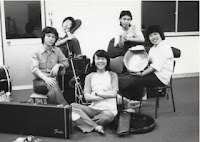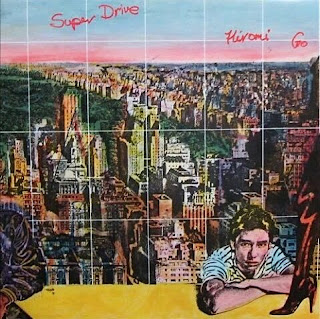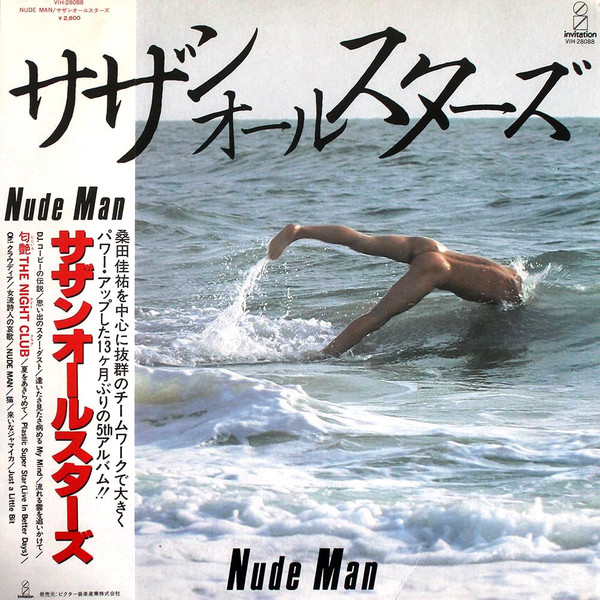
Sugar Babe was a band starring Tatsuro Yamashita(山下達郎), Taeko Ohnuki (大貫妙子), and Kunio Muramatsu (村松邦男), that's considered legendary in today's time for creating the modern sound of City Pop with their one and only album, SONGS. Unfortunately during the time they were active they were not a commercially successful band, due to that and creative differences with the members, they broke up without making a follow-up album. While we may never know what a true 2nd Sugar Babe album would sound like, one amateur band would take the challenge of creating an unofficial sequel to SONGS; So Nice, with their 1979 album, LOVE.

While Sugar babe was active, a majority of their fanbase was college students. One of these college students was Katsuyuki Kamakura who entered Nihon University College of Art on May 24, 1975. Kamakura was impressed with Sugar Babe's performance at the Tin Pan Alley Festival at Nakano Sunplaza in Tokyo. Kamakura, inspired to create songs that incorporated Tatsuro's composition techniques, formed his own band through the Folk Music Club at his school, called So Nice. The name So Nice came from the lyrics of a Minako Yoshida (吉田美奈子) song from her 1976 album FLAPPER, "Rum wa O-suki?" (ラムはお好き?... Do You Dig Rum?). Kamakura was the front-man and lead singer alongside female vocalist Misako Matsushima. Throughout their early years, they gave small concerts on campus performing covers of songs by Sugar Babe and Tatsuro Yamashita. Upon the band's graduation from the university in 1979, they issued their lone full-length album, LOVE, comprised of fully original material, in an extremely limited private press of 200 copies.
CREDITS
Drums - Nobuhide Mori(森信英)
Bass - Yoshiaki Takeuchi(竹内嘉章)
Hideaki Chounan (長南秀明)
Keyboard - Koji Yoshida(吉田浩二)
Guitar, Vocals - Katsuyuki Kamakura (鎌倉克行)
Piano, Vocals - Misako Matsushima (松島美砂子)
Vocals - Hiromi Nakamura (仲村裕美)
Guitar - Masahiko Tsuboi(坪井正彦)
Piano - Hiroyuki Miyaguchi (西口博行)
THE MUSIC
So Nice: ⭐⭐⭐⭐⭐
光速道路 [Kōsoku dōro / Lightspeed Highway]: ⭐⭐⭐⭐
Last Kiss: ⭐⭐⭐⭐⭐
陽だまり [Hidamari / Sunny Spot]: ⭐⭐⭐⭐
Tight Night: ⭐⭐⭐⭐⭐
Love Sick: ⭐⭐⭐
かけぬける風 [Kakenukeru kaze / Crossing the Wind]: ⭐⭐⭐⭐⭐
Earth Mover: ⭐⭐⭐⭐⭐
別離 (わかれ) [Betsuri (Wakare) / Parting]: ⭐⭐⭐⭐
Dancing All Night Long: ⭐⭐⭐⭐⭐
THE VERDICT:
LOVE certainly feels like listening to a long-lost Sugar Babe album. It’s very clear that the compositions, at least at the beginning of the album, are pastiches of Sugar Babe songs. Unfortunately, it makes their sound feel antiquated compared to other records that came out during this same time period. However, unlike SONGS, LOVE has a mellower, jazzier, nighttime sound and aesthetic that creates a greater sense of continuity between tracks, making it much more enjoyable to listen to.
The intro simply called So Nice, is simply beautiful and mesmerizing, reminiscent of the Acappella/doo-wop intro from Eiichi Ohtaki's debut album. Lightspeed Highway sounds like they combined elements Downtown and Somehow Today (今日はなんだか) to create a high octane soft rock song about driving through the city at night. The acoustic love ballad, Last Kiss, is a beautiful homage to Days Gone "60's Dream", with an extra layer of depth thanks to the backing chorus and ocean ambiance in the background. It also helps that Kamakura sounds eerily similar to Yamashita himself. Matsushima serves well as an analog to Taeko Ohnuki, her best one being Tight Night, a cool jazz-rock number accentuated by its funky bassline and groovy piano melody.

The band starts coming into their own in the latter part of the record, with songs like Crossing The Wind, resembling something closer to Circus Town or Spacy. There's a great use of synths here that blend in well with the cold mysterious atmosphere of the song. Then there's my favorite song, Earth Mover, a breakup song that straddles the line between, funk, and slow surf rock. Parting is a lovely sounding 60s style ballad with great harmonies coming from both Kamakura and Matsushima. Dancing All Night Long closes off the album with a full-on Latin-tinged dance number that builds up to another doo-wop-style harmony.

Overall, LOVE proves to be a worthy successor to SONGS. It carries on that Sugar Babe charm with an extra layer of pazazz. It's got great compositions that build on what made SONGS good in the first place and in many ways enhance it. It's also just a damn good album on its own merits. It's a nice blend of soft rock & jazz. The cheaper self-production doesn't really hinder the music for me since the compositions are so strong, to begin with, and the band members are all clearly putting in 100%. If anything the amateur production gives it a slight garage rock feel to it. LOVE is a hidden gem that should be in everyone's City Pop collection.
Thanks to the resurgence of City Pop's popularity, So Nice has made a comeback doing what they did decades ago; covering Tatsuro Yamashita songs while occasionally coming out with really good original music. They came out with a single in 2018 called Sunday Summer Train (日曜日のサマートレイン). They've even done some live performances with former Sugar Babe member, Kunio Muramatsu! Things seem to be looking up for this underrated City Pop band, and I would highly encourage showing your support by buying a reissue of So Nice today. Preferably the 2018 Limited Edition with all of the Bonus songs.



















